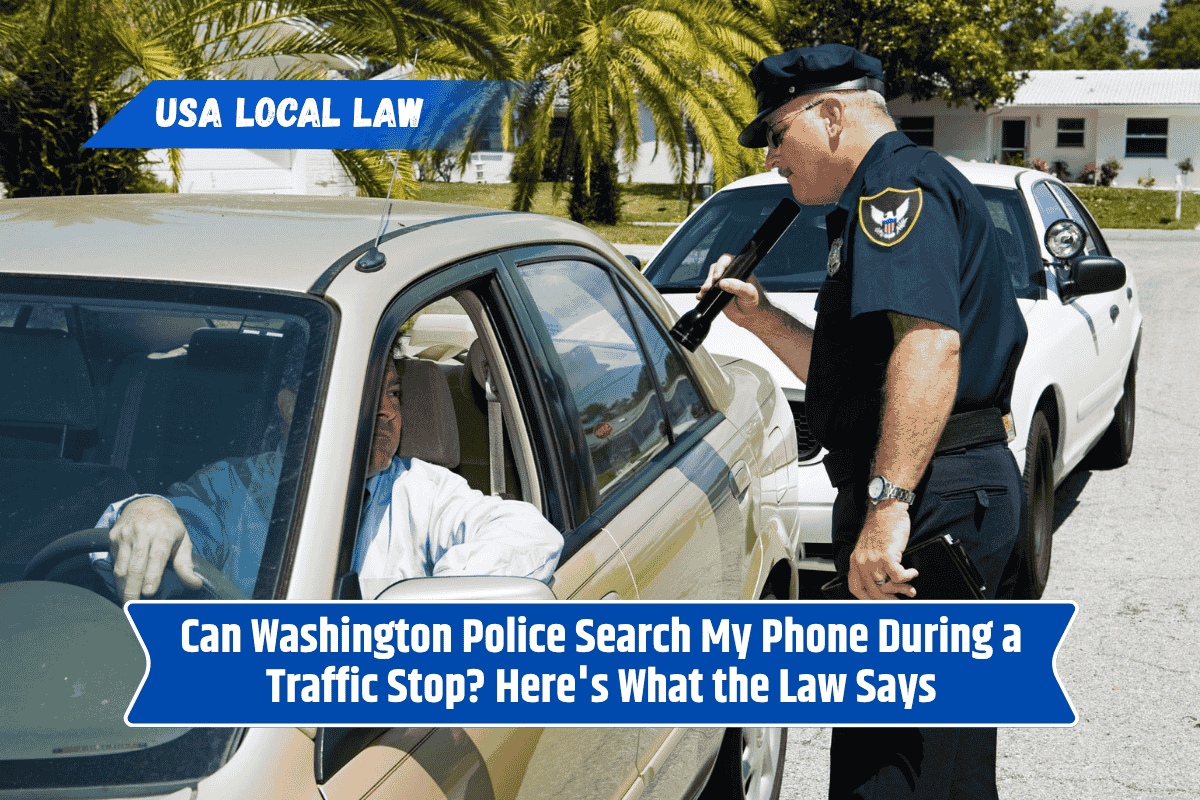If you’re pulled over during a traffic stop in Washington, you may wonder whether police have the right to search your phone. With the growing reliance on smartphones for communication and personal information, it’s an understandable concern.
Can the police search your phone just because they’ve stopped you for a traffic violation? Understanding your rights and the law surrounding phone searches during a traffic stop can help you know when to comply and when to assert your rights. Let’s dive into what the law says about phone searches in Washington.
Can Police Search My Phone During a Traffic Stop in Washington?
In Washington, as in the rest of the United States, police cannot search your phone during a traffic stop without your consent or a valid legal reason.
The U.S. Supreme Court has ruled that cell phones are considered private property, and they contain highly personal information, which requires protection under the Fourth Amendment. This means that police generally need a warrant, consent, or exigent circumstances to search your phone.
The Fourth Amendment and Your Rights
The Fourth Amendment of the U.S. Constitution protects citizens from unreasonable searches and seizures by the government, including law enforcement.
This means that, in most cases, police need either your consent or a warrant to search your belongings, including your phone, unless there are special circumstances that justify the search.
If a police officer wants to search your phone, they typically must have probable cause or a warrant. A warrant is an official document issued by a judge that grants police permission to search a specific item or location.
Probable cause means that police have a reasonable belief that the phone contains evidence of a crime or could be linked to criminal activity.
Exceptions to the Rule
There are a few exceptions to this general rule where police may search your phone without a warrant or your consent during a traffic stop:
- Consent: If you voluntarily give the officer permission to search your phone, they may do so. However, you have the right to refuse this request. It’s important to remember that your consent must be given freely, and the police cannot coerce you into allowing the search.
- Exigent Circumstances: If the police believe that there is an urgent need to search your phone — for example, if they suspect that evidence might be destroyed or that someone’s safety is at risk — they may be able to search your phone without a warrant under the “exigent circumstances” exception. However, this is a rare situation and typically requires immediate action by law enforcement.
- Incident to Arrest: If you are arrested during a traffic stop, police may have the right to search your phone as part of a “search incident to arrest.” However, this only applies if you are arrested, and the search must be reasonable in scope.
The Supreme Court’s decision in Riley v. California (2014) ruled that police generally cannot search a cell phone without a warrant, even when someone is arrested, unless there are special circumstances.
The “Riley v. California” Case
The landmark 2014 Supreme Court decision in Riley v. California set a significant precedent regarding cell phone searches. In this case, the Court ruled that police cannot search the contents of a cell phone without a warrant, even if the individual is arrested.
The Court recognized that cell phones contain vast amounts of personal data, and searching them without a warrant would violate the Fourth Amendment protections against unreasonable searches.
The Riley decision specifically addressed the fact that smartphones are unlike any other item law enforcement might typically search during an arrest. As a result, police must now obtain a warrant before searching the digital contents of a phone, even if the individual has been taken into custody.
What Should You Do During a Traffic Stop?
If you’re pulled over during a traffic stop in Washington and police ask to search your phone, you have the right to refuse. Here’s what you can do to protect your rights:
Stay calm and respectful: Politely decline the search by saying, “I do not consent to a search of my phone.”
Understand your rights: If the police officer has a valid warrant or exigent circumstances, they may search your phone. If they don’t, they must respect your rights.
Know when you’re arrested: If you’re not arrested, the police typically cannot search your phone without a warrant or consent. If you’re arrested, they may search your phone incident to the arrest, but this will still be subject to the restrictions established by Riley.
In Washington, police cannot search your phone during a traffic stop unless they have your consent, a warrant, or a valid legal reason such as exigent circumstances or an arrest.
The landmark Riley v. California case ensures that law enforcement must respect your Fourth Amendment rights when it comes to personal devices like cell phones. Always know your rights, and if you are unsure or feel uncomfortable with a request for your phone, it’s always best to calmly assert your right to privacy.
